What Is a Vehicle Tracking System & Why Your Business Needs One
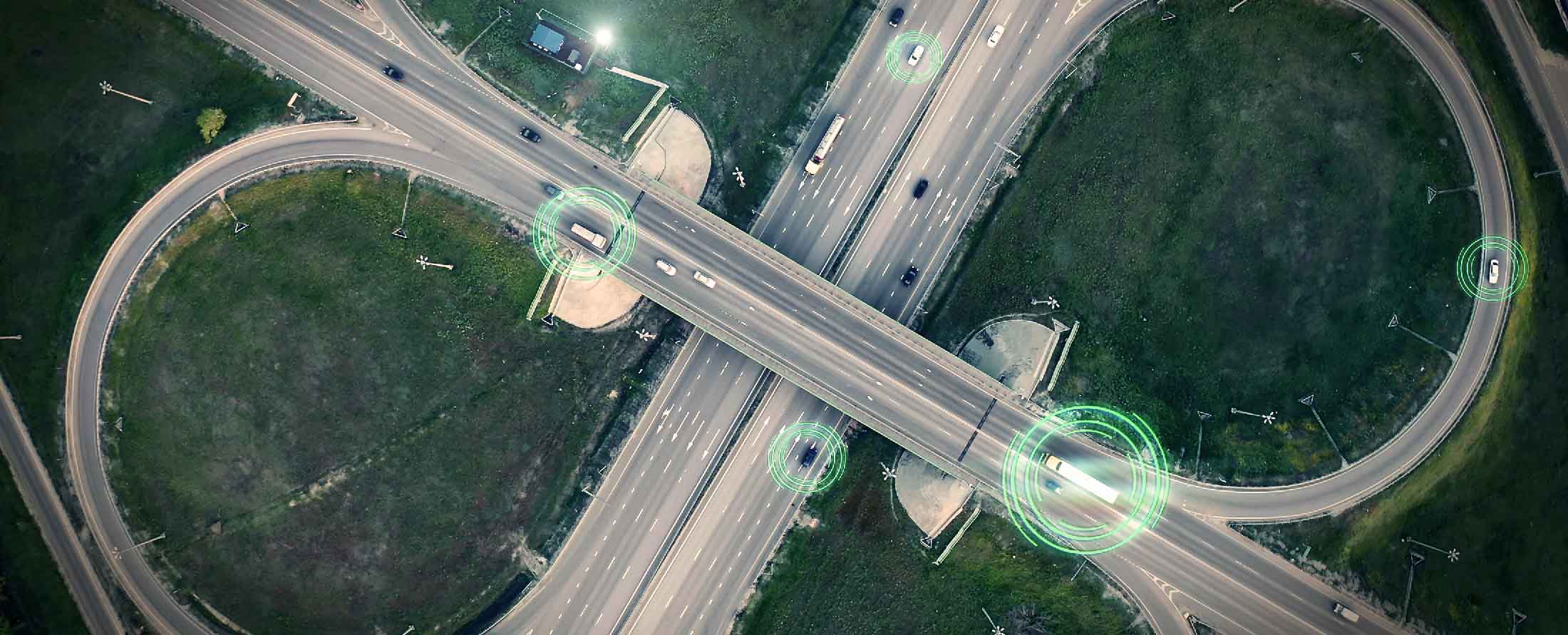
For any shipping, delivery, or field service company, your dispatchers need to know where your drivers or technicians are in real time.
But because of a history of expensive installation and initial costs, less than 30% of transportation companies use vehicle tracking, according to Global Market Insights.
But it’s a different story in 2020. Vehicle tracking has become a lot more affordable. With new technology and mobile app solutions that have zero upstart fees, suitable vehicle-tracking solutions are now available for all companies, large and small.
We’ll cover what a vehicle tracking system is, and show you how to use it to improve the flexibility and scalability of your fleet.
Let’s get started.
To navigate to the section which interests you most, click below:
- What Is a Vehicle Tracking System?
- Why Are So Many Businesses Tracking Their Vehicles?
- How Do Businesses Use OptimoRoute to Track Their Vehicles?
- The 4 Types of Vehicle Tracking Systems
- More Than Just Vehicle Tracking With OptimoRoute
What Is a Vehicle Tracking System?
A Vehicle Tracking System (VTS) is a solution that tracks the location of a vehicle, and either records it or transmits it to a central data-collection system.
A VTS typically uses GPS tracking devices to track vehicle locations, and then a 3G or 4G connection to communicate with a company’s fleet management system.
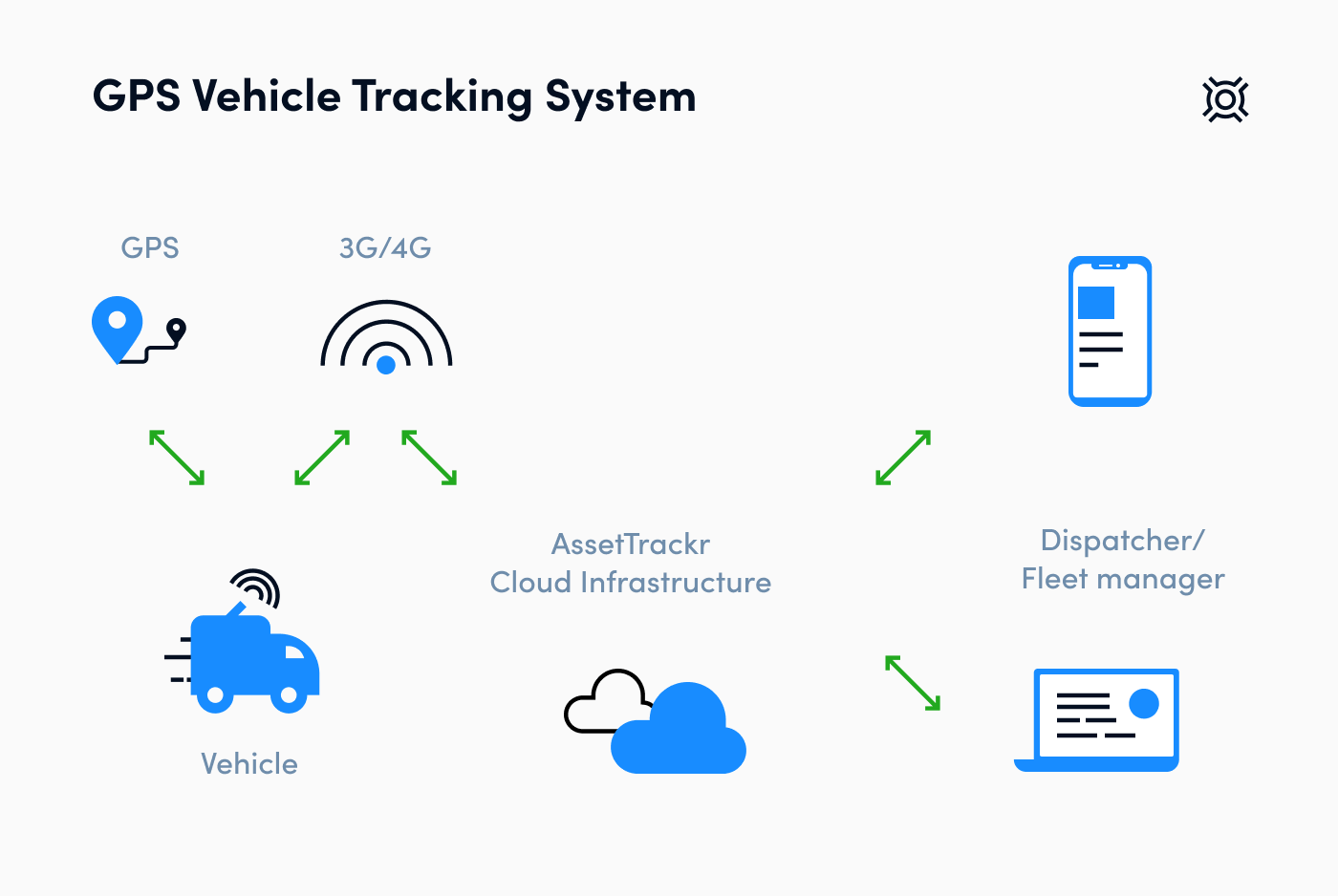
As businesses focus on digital transformation, many invest in vehicle trackers too.
Why Are So Many Businesses Tracking Their Vehicles?
More and more companies are investing in tracking solutions for their fleet.
A report by Allied Market Research predicts the vehicle tracking system market will grow from $3.795 billion in 2018 to $14.957 billion by 2025.
But why? Is GPS fleet tracking really such a big deal?
It really is. Giving dispatchers access to real-time locations helps improve fleet efficiency across the board. Just like on the football field, a quarterback needs to know where his “players” are at all times.
There are many benefits to using a fleet tracking system:
Adjust routes in real-time for last-minute orders and cancellations
By tracking your commercial vehicles in real time, your dispatchers can easily adjust routes to accommodate last-minute changes. For example, if a customer makes a same-day order or cancels at the last second.
Provide live ETAs to customers
Instead of an inaccurate estimate, you can provide real, live, up-to-second ETAs for all your shipments and appointments.
Forecasting capacity
With real-time location data, your fleet managers can forecast delivery capacity in areas (by knowing the live capacity and location of all trucks).
Anti-theft and recovery
If equipment or vehicles go missing, you can hunt them down with a GPS tracking system. Not convinced yet? Let’s take a look at how vehicle tracking works in the real world.
How Businesses Use OptimoRoute to Track Their Vehicles
OptimoRoute gives businesses the ability to track drivers in real-time by accessing their location sent to the software through a mobile app.
No need to install a black box in every vehicle (unless industry regulations require it).
Modern mobile phones offer state-of-the-art GPS and geofencing technology, similar to hardware solutions.
It’s an inexpensive and effective way to track your vehicles, their routes, fuel usage, and delivery progress.
Plus, with OptimoRoute, the GPS-tracking is just the icing on the cake.
Our software has many powerful features including estimated time of arrival at location or breadcrumbs that show where the driver was forced to deviate off route.
Fleet tracking in action: Hardie’s Fresh Foods
With OptimoRoute, dispatchers and fleet managers have all the information they need at their fingertips.
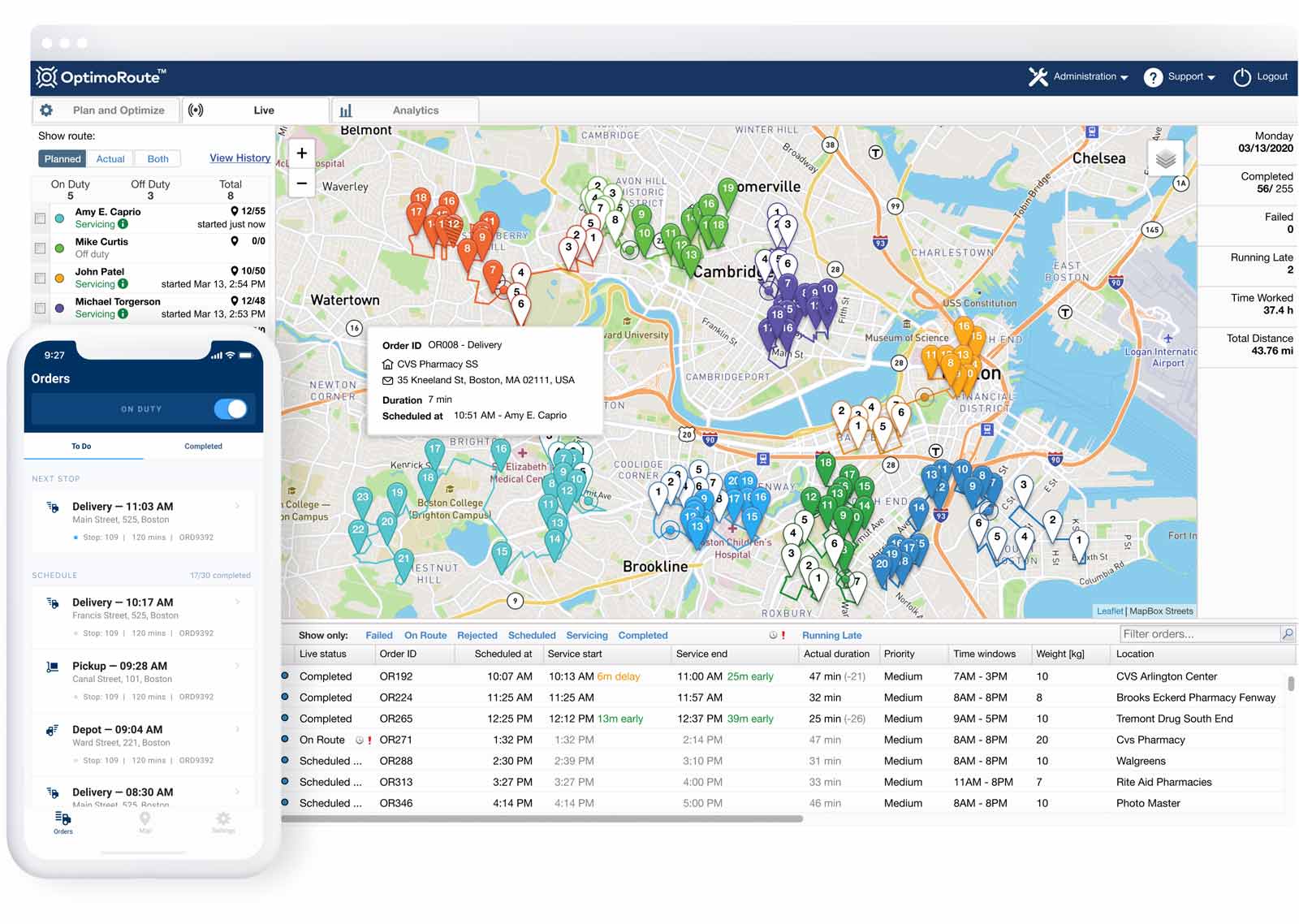
That makes it easier to be flexible and meet all customer demands, no matter how challenging.
Hardie’s Fresh Foods is proof of that. The food distribution industry is highly competitive, with price pressures encroaching on their profit margins.
They needed to improve the efficiency of their operations to improve their bottom line, and give them room to expand.
That’s when their logistics managers found OptimoRoute, and the results speak for themselves.

OptimoRoute provided necessary data on vehicle utilization, and helped Hardie’s make more deliveries with fewer trucks on the road.
More efficient routes lead to 20% reduced mileage and big savings on fuel. Plus, planning was eight times faster, giving dispatchers some room to breathe.
With OptimoRoute, you can fit in last-minute deliveries into existing routes with the click of a button.

Even better, the driver will automatically receive the automated route and directions in the driver app.
But that’s not all OptimoRoute can do.
Share order tracking information and ETAs with customers in real-time
OptimoRoute also offers Realtime Order Tracking with live text and email notifications to customers.
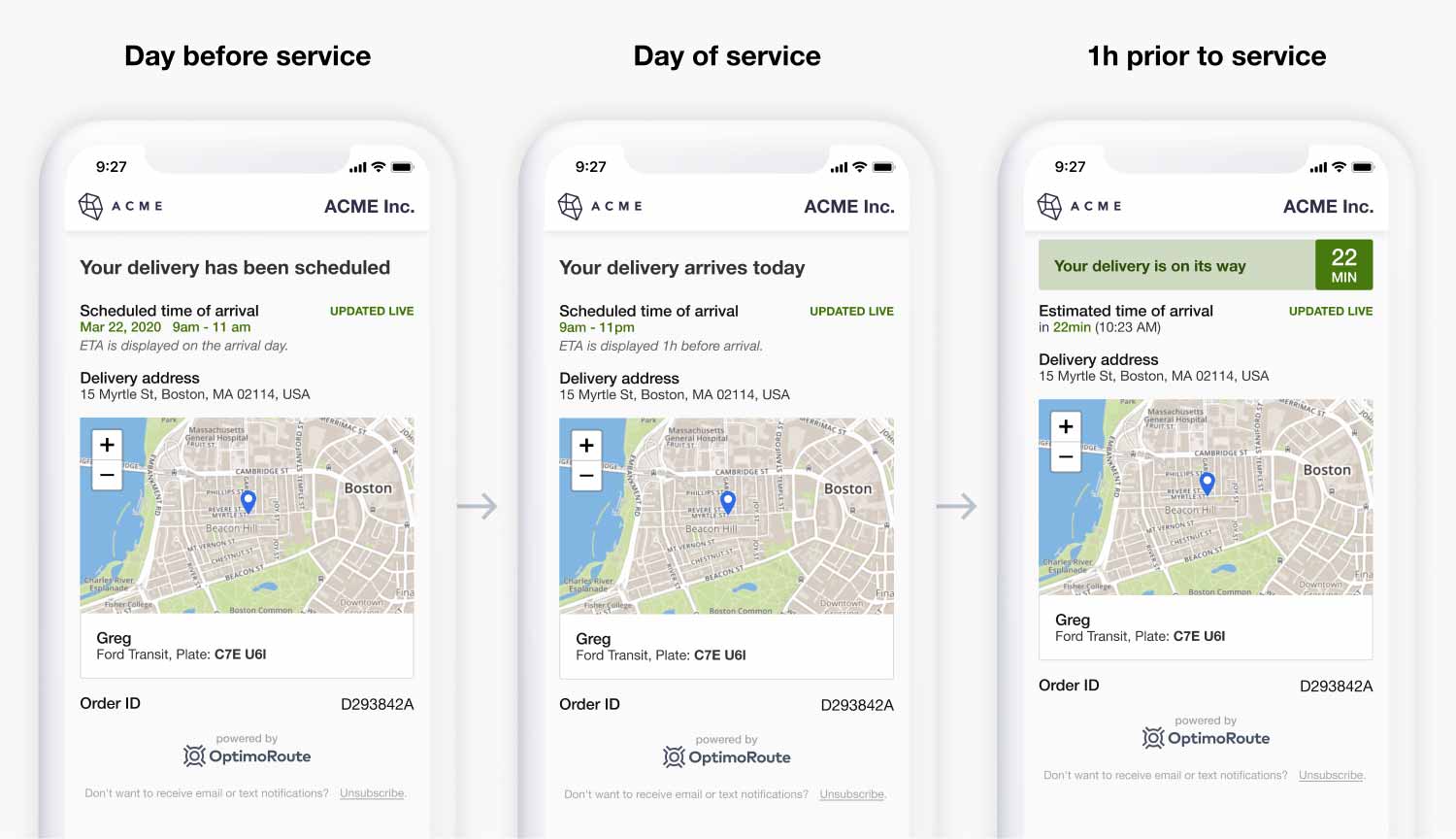
It’s a great way to improve customer support and give each customer a better experience.
“Customers love the Realtime Order Tracking email and text message notifications – it lets us make no-contact deliveries and it lets them know when to expect us (so their cold beer doesn’t wait outside in the warm spring sun!)”
– Petar Nauković, Operations Manager, Medvedgrad
But it doesn’t end there.
Compare driven with planned routes
OptimoRoute also offers in-depth historical data on driver behavior and performance.
Our unique breadcrumbs view compares your drivers actual routes (dotted lines) with their planned routes (colored lines) to see their driving habits and how efficiently they complete routes.
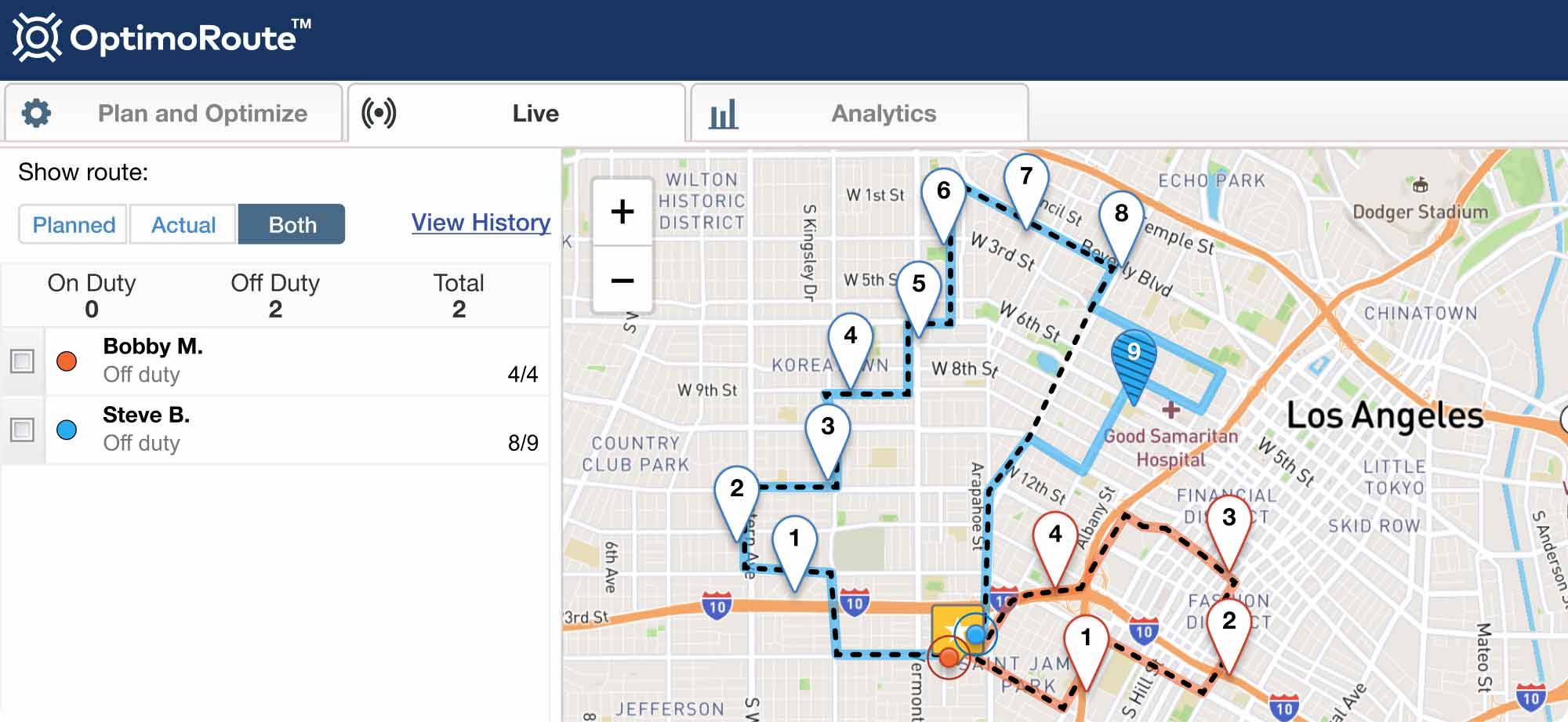
It will help you discover potential driver issues as well as uncover any inefficiencies with routing based on new developments to help drive down fuel costs.
Of course, you can also see important live data for your drivers.
See live performance data like delays, delivery status, and more
Instead of trying to keep track of all drivers on a live map, dispatchers can use a dashboard that shows the most important data points.
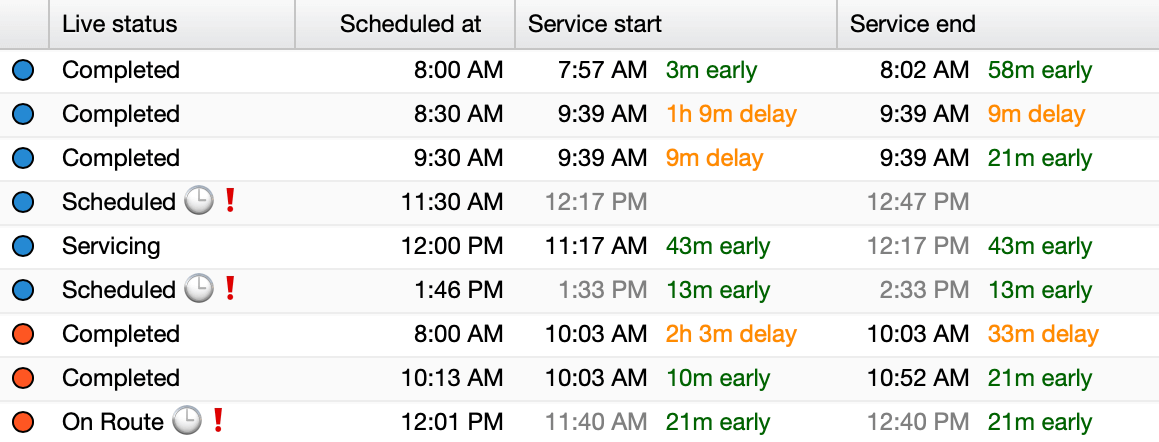
The delivery status is tracked through the driver app, and ETAs can help identify delays before they happen. Of course, a mobile app isn’t the only way to track your drivers.
The 4 Types of Vehicle Tracking Systems
If you’re looking to implement a tracking device for your business, you have a variety of solutions to choose from.
Passive GPS trackers (Anti-theft and asset location)
Passive GPS vehicle trackers aren’t constantly connected to tracking software, but instead passively log the location of the vehicle.
They can be remotely activated in the case of a driver checkup or vehicle theft.
Telematics (Real-time vehicle tracking & monitoring)
Telematics is a hardware solution installed in a truck or other vehicle. It connects to the ECU and also tracks basic metrics like fuel consumption and braking, not just GPS locations.
They can cost up to $75 a month and include one-time installation fees of up to hundreds of dollars.
ELD (Electronic logging device)
An ELD is a vehicle tracking device that monitors the hours a driver spends on the road, to ensure their compliance with HOS regulations.
Mobile app tracking system (Real-time)
The most affordable and easy to set up solutions rely on your drivers’ existing cell phones with mobile apps.
For example, with the OptimoRoute mobile app you can track your drivers through GPS. You can also track order progress and send drivers new delivery lists.
Note that mobile apps alone don’t meet the requirements for tracking in some regulated industries.
More Than Just Vehicle Tracking With OptimoRoute
By now, you should understand how tracking can play a key role in improving the productivity of your fleet.
OptimoRoute’s fleet management software offers easy-to-implement fleet tracking for businesses of all sizes. Through our Mobile App, you can easily keep track of drivers in real-time with access to detailed analytics, tracking, and live ETAs through text and email.
But that’s not all we can do. OptimoRoute offers top-of-the-line route optimization and planning, helping you save time on scheduling, and reduce mileage and overtime costs.
Our powerful software adjusts for real-life variables like time windows, driver schedules, service areas, vehicle capacities, and more.
To see how OptimoRoute can improve your fleet efficiency, start your 30-day free trial today.
Try OptimoRoute™ for Free
No installation or credit card required


